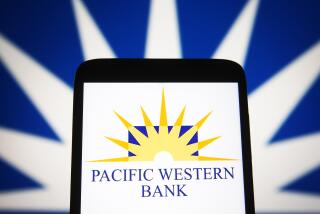Qwest Revision May Take Months
- Share via
A day after Qwest Communications International Inc. admitted misreporting at least $1.16 billion in revenue, the phone company said Monday it may take months to restate its financial reports.
The improper bookkeeping, which will force restatement of financial results for 2000 and 2001, heightened fears that the Denver-based carrier may be felled by its $26 billion in debt.
Investors sent the company’s shares down as much as 26% during Wall Street’s big rally Monday but reversed course enough for the stock to close at $1.49, down 1 cent. About 46.5 million shares changed hands, more than triple the stock’s average daily volume on the New York Stock Exchange.
Richard Notebaert, who replaced longtime Chief Executive Joseph Nacchio last month, said in a conference call that the company improperly accounted for sales of telecommunications capacity on its fiber-optic network from 1999 through 2001 and also made mistakes recording equipment sales and accounting for certain expenses.
Notebaert said the company’s review won’t be completed for several months and that Qwest would not issue restated financial reports until then.
The company plans to announce its second-quarter results Aug. 8, as planned, but Notebaert and Qwest Chief Financial Officer Oren Shaffer will not sign off on the company’s financial statements by Aug. 14, as required under new federal rules.
Notebaert said the two executives would notify the Securities and Exchange Commission that they could not comply because of the pending restatements and ongoing investigations into the company’s accounting practices.
“Qwest needs to come clean, and it’s in the process of coming clean with the government investigators and investors,” said Scott Cleland, CEO of Precursor Group, an independent research firm. “Qwest has a good new management team, but they’re going to need some luck and goodwill from investors, the government and the banks to weather this storm.”
Cleland and others say the telecommunication firm’s biggest worries are its more than $26 billion in total debt and the growing possibility of defaulting on some requirements under key bank agreements, which require Qwest to maintain a certain ratio of debt to EBITDA, or earnings before interest, taxes, depreciation and amortization.
Some of the accounting errors involve the company’s QwestDex Yellow Pages unit, which Qwest plans to sell to help reduce debt. If the expected restatement significantly changes the financials at QwestDex, Qwest may not get the expected price of $8 billion to $10 billion for the unit and so will have less cash to pay down debt.
“This is a company that is not going out of business, but it’s a matter of whether the company is worth enough to support the debt,” said analyst Richard Klugman of Jefferies & Co., which downgraded the stock to “sell” Monday. Jefferies does not have investment banking business with Qwest. Klugman said he has a small, passive investment in the firm.
On Monday, Qwest executives acknowledged that they are talking with the company’s “financial partners,” but they would not discuss whether the coming financial restatements would trigger more onerous requirements from the banks.
Qwest said that it incorrectly accounted for fiber-optic capacity sales to other carriers under long-term contracts, a type of transaction that has come under fire as a way for telecommunications firms to inflate revenue.
In cases involving Enron Corp., Global Crossing Ltd. and others, investigators believe the companies engaged in roughly equivalent capacity “swaps” with each other, giving both firms a “sale” even though neither company collected additional cash.
Qwest officials would not characterize the problems with its capacity sales, except to say that the misstatement involved about $1.16 billion in revenue from 1999 to 2001, representing about 18% of the company’s capacity sales during that period.
The company and its new auditor, KPMG, also discovered bookkeeping problems involving the sale of equipment and the purchase of certain services from other carriers.
Qwest once was primarily a long-distance provider, but it became the dominant local phone service provider in 14 Western states when it bought US West in 2000. That deal has provided Qwest with a steady flow of cash in the midst of cratering prices for long-distance service and plummeting demand for high-volume data connections.






